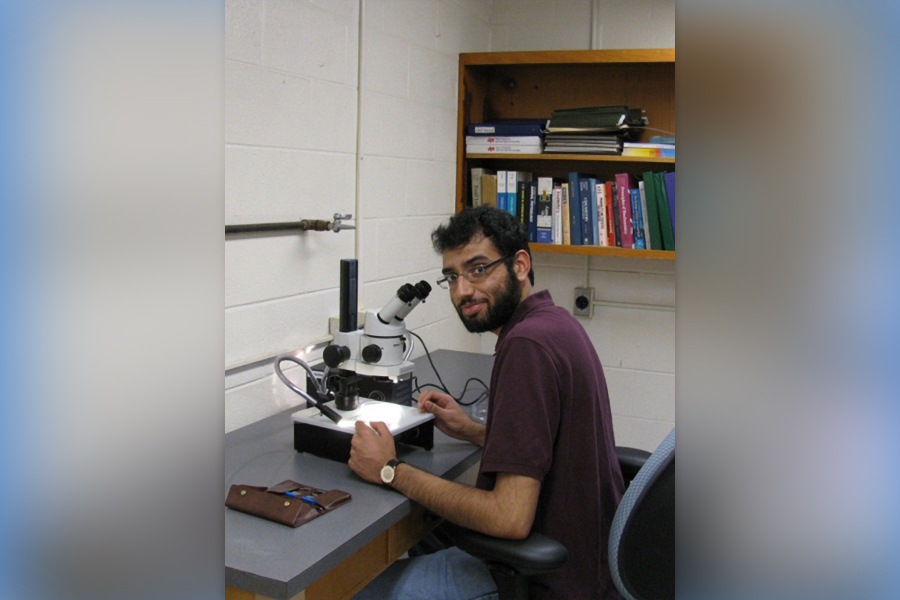Alumni Spotlight: Arvind Shantharam

Arvind Shantharam earned his doctorate in marine biology and biological oceanography from the Department of Earth, Ocean and Atmospheric Science, part of the College of Arts and Sciences, in May. Part of Shantharam’s research focused on the effects of the Deepwater Horizon oil spill in the Gulf of Mexico.
What brought you to Florida State University?
I graduated from the University of Maryland, Baltimore County, with my bachelor’s degree in environmental science and earned my master’s degree in applied ecology at the State University of New York at Stony Brook. I had been working in the fields of marine science and benthic/seafloor ecology for a few years when I came across a project to study the deep-sea impact of the 2010 Deepwater Horizon oil spill impact in the lab of FSU assistant professor of oceanography Amy Baco-Taylor. The project seemed immensely fascinating and Doctor Baco-Taylor has an excellent record in deep-sea ecology, so I jumped at the opportunity.
What inspired you to study biological oceanography?
In taking on my master’s project, I was thrown into the world of marine ecology without any real previous exposure to it. To familiarize myself with the field, I took a course on biological oceanography and immediately became fascinated with the wide variety of life, especially invertebrate life, found in the oceans. It was like seeing lifeforms from an alien planet, and I wanted to know more. I kept looking for opportunities to study these diverse marine invertebrates, and I haven’t looked back since.
What aspect of your area of study do you find the most fascinating?
I get to work to with organisms from remote parts of the world that few people ever get to see or have even heard of and try to figure out their ecology. From there, you can encounter puzzling patterns that are fun to try and solve. It’s immensely satisfying to observe or figure out something no one else has discovered.
Tell me a bit about your research. How much time have you spent at sea, and what discoveries have you made?
I study the spatial and temporal ecology of communities of small, seafloor organisms called macrofauna (fruit fly-sized animals) that span a huge variety of species including various kinds of worms, crustaceans, molluscs, echinoderms like sea stars and urchins, and more. Macrofauna have a long history of being used as measures of environmental status and integrity, ideal for measuring ecological impact or ecosystem processes.
Particularly for my dissertation, I studied how these species responded to the Deepwater Horizon oil spill in the Gulf of Mexico, in an ecosystem known as the DeSoto Canyon, through both space and time. From our data collected two years after the spill, macrofauna in the DeSoto Canyon generally showed mild to moderate levels of impact from the spill based on the data of various biological indicators. This is likely a product of the relatively low deposition of polyaromatic hydrocarbons and pollutants from the Deepwater Horizon wellhead that luckily never reached toxic levels for these organisms. Further, I characterized the distribution of the diversity of seafloor-dwelling molluscs across the entire gulf, from the coastline to the deep abyssal plain.
My work in the Gulf usually meant a week or two at sea, intensively sampling mud from the ocean bottom. Other exciting projects I have taken part in include evaluating the recovery of deep-sea coral from trawling, a large-scale fishing method that hurts the aquatic ecosystem, on seamounts in the Pacific Ocean alongside EOAS researchers Nicole Morgan and Doctor Amy Baco-Taylor. I also studied the community ecology of macrofauna that live on the back of loggerhead sea turtles with assistant research faculty Jeroen Ingels of the Coastal and Marine Laboratory. These projects are ongoing, but the results will be exciting! For these other projects in the Pacific, I have spent up to two and a half months at sea collecting samples and data. It’s rigorous but rewarding.
Are there any faculty or staff who have helped and/or inspired you?
First and foremost, my adviser, Doctor Baco-Taylor, has been a great source of wisdom and guidance for my projects, and I will forever be grateful for that. My committee also provided useful advice and many helped me by offering space or equipment to complete my research. My lab mates and other colleagues, who are too numerous to name here, were tremendous in helping me to adjust to life in graduate school and at sea, and I hope we will remain lifelong friends. Also, our academic coordinator Michaela Lupiani is an unsung hero to me and many other students for helping us navigate the trials of academic life.
How did you maintain your research and commitment to academic success due to the COVID-19 pandemic?
Conducting research imbues one with a “can do” attitude despite many hurdles. I have largely relied on that to get through this troublesome time and many before this. It also helps to have a strong support network of family and or friends to fall back on.
What do you like to do when you’re not doing schoolwork or research?
I indulge in a number of hobbies, including hiking, reading science fiction and playing the guitar. Before the pandemic, I also enjoyed spending time attending concerts and the theater.
Now that you’ve graduated, what are your plans?
I hope to continue working in research, particularly in the field of ocean conservation. The form and shape that will take remains undecided, but that’s the exciting part.
Although you might miss FSU, what are you looking forward to in your post-graduate life?
I aim to learn new skills and gain new experiences, and I hope to never stop searching for knowledge and making discoveries.
What advice do you have for fellow students?
Always keep looking for things that inspire and motivate you and don’t forget to keep dreaming.
